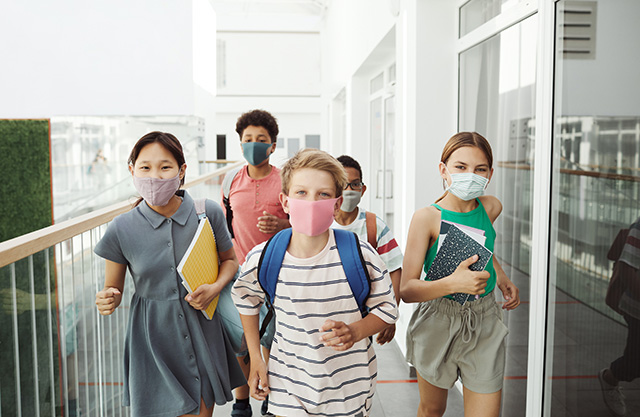As Approval of a COVID-19 Vaccine for Younger Kids Draws Near, a Survey Shows Parents’ Concerns About Vaccines Grew
Nearly one-third of parents said they were unlikely to get their kids under 12 vaccinated
Get all our news
It is important to encourage parents to recognize the individual and collective health benefits of vaccination and consider those along with any perceived risks.”
James Druckman
IPR political scientist

On October 26, the Food and Drug Administration's vaccine advisory committee voted to endorse use of the Pfizer-BioNTech COVID-19 vaccine on 5- to 11-year-olds. If approved, this could set the stage for the Biden administration to move forward on its plan to vaccinate the 28 million children in this age group as early as November. But a key question remains: How many parents will vaccinate their younger children?
New survey results from researchers at Northwestern, Northeastern, Harvard, and Rutgers universities show 52% of parents with children under 12 would be extremely or somewhat likely to vaccinate their kids, but 34% of parents reported being extremely or somewhat unlikely to vaccinate their children.
The survey also reveals parents’ concerns about COVID-19 vaccines for children grew from June 2021 to September 2021 across all demographic groups. Additionally, parents are most concerned about the possible long-term effects of the COVID-19 vaccines and if the vaccines underwent enough testing. Parents’ concerns about the long-term effects spiked from 50% in June to 65% in September. Concerns about testing grew from 51% to 63%.
“It seems that parents recognize the clinical trials have been unable to gauge long-term effects,” said IPR political scientist James Druckman, who collaborates with the consortium of universities and has tracked attitudes and behaviors on the coronavirus since April 2020. “Thus, those concerns need to be addressed with more general conversations about what the scientific community knows about over-time effects of vaccines more generally.”
According to Druckman, the results also suggest the Biden administration may face an uphill battle in executing their vaccination plan—which taps more than 25,000 pediatrician offices, community health centers, schools, and pharmacies to help vaccinate young kids—if they can’t alleviate parents’ concerns about the vaccine.
Between August 26 and September 27, Druckman, IPR graduate research assistants and PhD students Jennifer Lin and Caroline Pippert, and their colleagues surveyed over 21,000 Americans. They asked parents in the sample about the top five concerns identified in the consortium’s survey in June:
- how new the vaccine is,
- whether the vaccine has been tested enough,
- if the vaccine works,
- immediate side effects, and
- long-term side effects.
Parents who report the most concerns about the COVID-19 vaccines include younger mothers ages 18 to 35, parents of young children, parents with unvaccinated children ages 12 to 18, Republicans and Independents, Black and Hispanic parents, parents without a college degree, and parents in rural areas.
Another finding reveals that nearly half of all parents in the survey said they are still on the fence about vaccinating their older children between ages 12 and 18. The FDA granted emergency authorization to vaccinate 12- to 15-year-olds in May. Since then, almost half (47%) of parents reported vaccinating their older children. But almost the same percentage of parents (46%) said none of their eligible children are vaccinated.
“It is important to encourage parents to recognize the individual and collective health benefits of vaccination and consider those along with any perceived risks,” Druckman said.
Other insights from the report:
- The likelihood of parents vaccinating children under 12 is strongly related to whether the parents are vaccinated, with 78% of vaccinated parents reporting they are extremely or somewhat likely to vaccinate their kids against COVID-19. Yet 58% of unvaccinated parents with children under 12 said they are somewhat or extremely unlikely to vaccinate their children in this age group.
- Both vaccinated and unvaccinated parents are most concerned about the long-term effects of the COVID-19 vaccine, with this concern increasing similarly across both groups. Vaccinated parents’ concerns about the potential side effects grew 17 percentage points—from 38% to 55%—and unvaccinated parents shifted 16 percentage points—from 65% to 81%.
- Parents, no matter their political party affiliation, cite long-term side effects as their No. 1 concern. Additionally, the increases from June to September are similar across political affiliations.
- Across different races and ethnicities, 71% of Black parents and 70% of Hispanic parents note that long-term effects are a major concern. However, parents of all races and ethnicities report more concerns about the COVID-19 vaccines for their children in September than in June.
- Younger mothers between 18 and 35 years old are more vaccine resistant to COVID-19 vaccines than fathers of all ages and older mothers. Their top concerns are whether the vaccines have been tested enough (74%) and their potential long-term side effects (74%).
Read the report on parental concerns about COVID-19 vaccines for kids.
James Druckman is the Payson S. Wild Professor of Political Science and IPR associate director and fellow. Jennifer Lin and Caroline Pippert are IPR graduate research assistants and PhD students in political science.
Photo credit: Pexels
This article was updated to reflect the FDA's independent advisory committee vote on October 26 to endorse a smaller dose of the Pfizer-BioNTech COVID-19 vaccine for emergency use on 5- to 11-year-olds, setting the stage for full approval.
Published: October 21, 2021. Updated: October 26, 2021.


